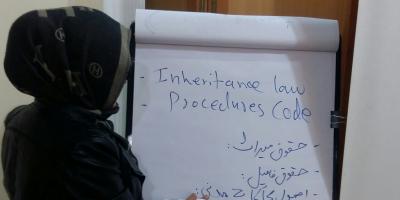
Mosooma* is 29 years old, and the only woman in a group of two dozen civil and commercial law instructors working for the Government and Bar Association in Afghanistan.
Married with a small child, every few months Mosooma travels hundreds of kilometers from her home in the mountainous region of central Afghanistan to a neighboring province to deliver training programs to her colleagues at the local office of the Ministry of Justice.
“I enjoy sharing my knowledge and skills with others,” she says. “Also, I think it’s important to train others so we can have more specialists.”
Having previously undergone capacity building sessions by IDLO, instructors go on to deliver courses to members of their respective institutions. The sessions are organized within IDLO’s Afghanistan Justice Institution Strengthening (AJIS) program, which also provides ongoing coaching support to trainers.
In her day job at the Ministry of Justice, Mosooma deals with criminal case law and legal aid. She explains the importance of her work: “By providing legal advice to poor families, I can help strengthen their access to justice and right to fair trial.”
She goes on to cite an example: “I worked on a case involving a woman who was head of her team. She was harassed by her subordinates and, one day, they threw something at her. When she sued them, the case was refused for a long time. I was able to push it through, and in the end they were arrested for violence against women.”
In another case, three brothers had falsely been imprisoned for murder. “For five years, the authorities tried in vain to show that they hadn’t committed the crime. After I started to work on the case, we were finally able to prove their innocence.”
But Mosooma does not have many female colleagues. She puts this down to low salaries and a lack of security, but also to the simple fact that lacking transportation facilities make it difficult for women to travel from rural areas to the provincial capital. She considers it critical to have more female legal professionals.
“Women can’t speak to male lawyers in confidence or share their problems,” she says. “In most cases, they won’t seek out a defense lawyer for their legal issues. It’s very important to have female justice professionals so women can take their problems to them easily.”
Civil and commercial law professionals have received a disproportionately smaller degree of support from the international community than criminal law professionals. This is especially the case at the provincial level, as rule of law assistance programs have traditionally focused on the capital, Kabul.
Yet training people closer to home saves beneficiaries time and allows curricula to be tailored to the needs of each region. With the right conditions in place, it also saves overall program costs in transportation and accommodation. So far, under the AJIS program, IDLO has organized courses in Badakhshan, Balkh, Bamyan, Herat and Nangarhar, with participants also invited to join from nearby provinces.
* name has been changed to protect identity

